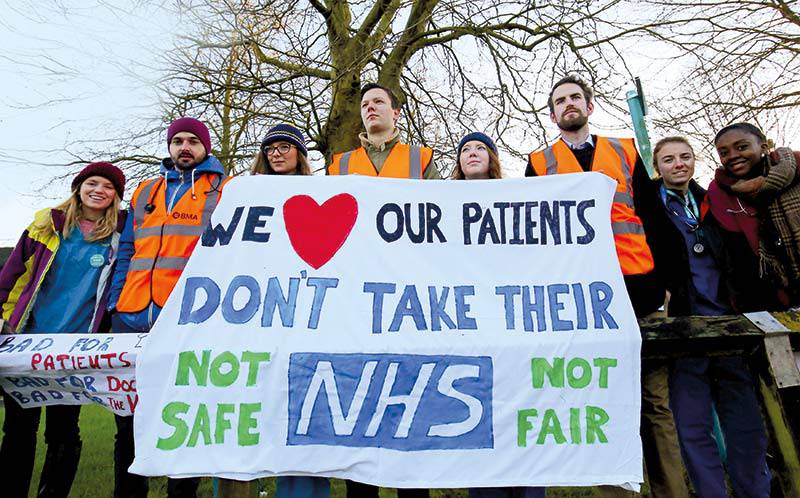For the first time in a generation, doctors across the country, including the Tunbridge Wells area, have gone on strike over proposed changes to working conditions.
The government has claimed it is vital to allow patients access to weekend medical care – which doctors, supported by the British Medical Association, have claimed will place too much strain on staff.
A total of 227 junior doctors are employed by Maidstone and Tunbridge Wells NHS Trust, working across its sites.
Staff at Pembury were among thousands of others in the country taking their place at over 100 picket lines yesterday (Tuesday, January 12th), with 4,000 routine medical procedures being cancelled nationally.
Rohan Kandasamy, 26, a first-year doctor at Tunbridge Wells Hospital, said patient safety was at the heart of their reasons for the strike.
Speaking to the Times, he said: “We feel that the current proposals about our contract will leave us in a position where the NHS Trust will put us in a position where we are working hours that are unsafe.
“The suggestions that have been made by government don’t offer any reassurance that we won’t end up working more hours – there’s no safety net there.
“With these contracts, it will be a less enticing job for the best and the brightest out there. The next generation of students may not be working in medicine because of this, and we are already
seeing young doctors leaving to go overseas to Australia.
“People are working so many hours that they end up making mistakes, such as one doctor in England who crashed their car as a result of being tired.”
He added that he had not seen any proposals on how junior doctors could be asked to meet enhanced demands of weekend working without providing increased staffing.
His colleague, Alice O’Connor, 27, a junior doctor working at Tunbridge Wells Hospital, said: “We are not against having 24/7 care if it is fully staffed at all times, which would be ideal.
“We know that our hours are not going to be 9am-5pm, which is the nature of the job. I think that our salaries are also adequate, and I wouldn’t dream of asking for more money. But the fact is we are being told that we will have less pay for working more hours – or at the least more awkward hours. I think anyone in any profession would be irritated by this.”
Another female junior doctor, who asked not to be named, added: “The strike is something that I have been pretty upset about as it’s not something that I would normally ever do.
“But this is something that we are taking very seriously as the contract that is being imposed is something that’s going to be unsafe for patients with doctors working longer hours.”
Health Secretary seeks more talks
Having failed to avert a doctors’ strike, Health Secretary Jeremy Hunt has urged the British Medical Association to continue negotiations.
The Secretary, who claimed that 40% of junior doctors turned out for work today, told the BBC: “The right thing to do is to sit round the table and talk to the Government about how we improve patient safety and patient care, not these very unnecessary strikes.”
On the issue of seven-day medical services, he added: “We recognise that if doctors are too tired they are not going to be able to give safe care to patients.
“But right now what happens is when a junior doctor is asked to work at weekends – which they do a lot – they go into an A&E department where, for example, there will be half as many consultants working on a Sunday compared to a weekday despite it being one of the busiest days.








